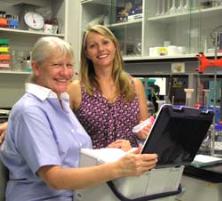Public welcome to hear of water's hidden health hazards
Published on 01 September, 2005
Rockhampton people are welcome to attend a public seminar about water’s hidden health hazards.
Dr Larelle Fabbro and Dr Leonie Andersen, of CQU, will present a seminar entitled ‘Toxins and contaminants causing environmental harm? – bioaccumulation and identification of biological effects’.
 The free event will be presented from 6.30pm on Wednesday, September 7, at CQU Rockhampton (Bldg 6/G.03), with refreshments from 6pm.
The free event will be presented from 6.30pm on Wednesday, September 7, at CQU Rockhampton (Bldg 6/G.03), with refreshments from 6pm.
The presenters said the aim of environmental management is to identify and reduce the health risks for both humans and other living organisms within the ecosystem.
Key to this management process is the rapid identification of toxic substances and the mode in which they act or are accumulated.
They said the presentation will describe projects on both macroscopic levels (identifying the causes of mass animal mortalities) and microscopic levels (use of stress enzymes in bio-indicator organisms), which facilitate environmental management.
Those in attendance can find out: why clear water is not always safe water; why algal blooms below the surface can be more dangerous; why cattle will drink from some algal blooms and die but will not drink from others; why toxic algal blooms can be dangerous even after the algae are dead or the water boiled; why metals accumulate in harbour marine life despite relatively low concentrations being present in the water and sediments; why some female snails in harbours grow a penis and how it can affect their love life; why banana prawns in Port Curtis sometimes turn purple; why oysters can lead a stressed life; why eating freshwater mussels from some locations could make you very sick; why mud crabs aren’t fussy eaters; and why mangroves may not be the most important food source for intertidal critters. For details/interview call Dr Fabbro via 4923 2181 or Dr Andersen via 4970 7315.
Photo: Larelle (left) and Leonie together in the laboratory.

